Celebrating International Day of The Girl Child!
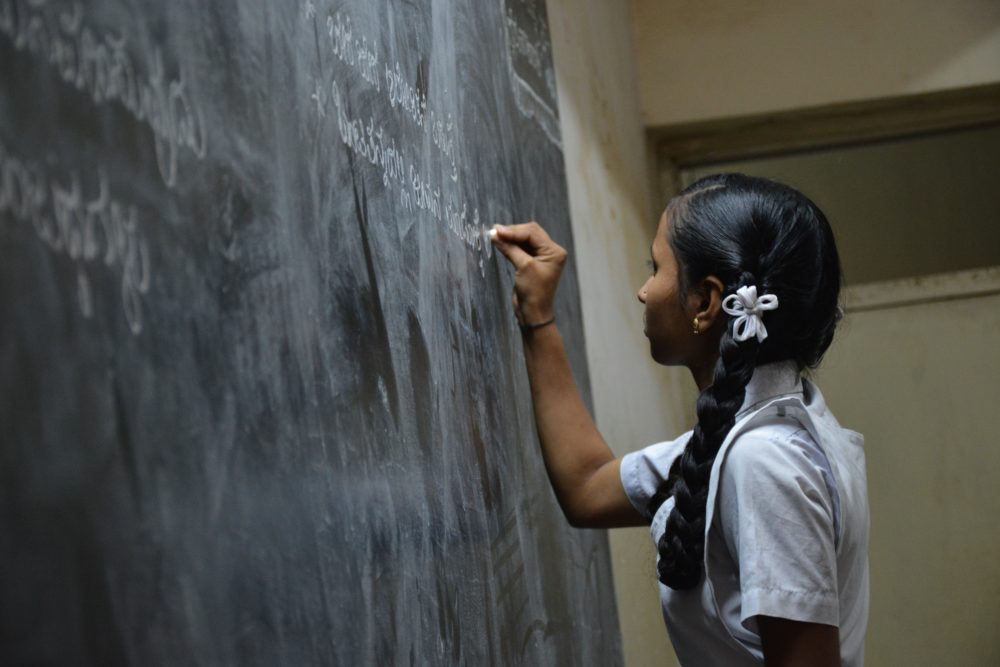
In 2012, the United Nations (UN) declared October 11th International Day of The Girl Child. Since then, this day has been commemorated internationally to empower girls and to raise awareness about the challenges they face. Every year, the International Day of The Girl Child is an opportunity to highlight problems in education, health, etc. and advance solutions for their alleviation.
With Her: A Skilled Girl Force
This year’s International Day of The Girl Child theme, “With Her: A Skilled Girl Force”, is a call to support girls as they innovate, inspire and transform their futures.
There are approximately 1.1 billion (UN women) girls in the world, many of whom lack equal access to opportunities enjoyed by their boy peers. Education, is vital, basic human right to which girls around the world are denied access. According to UNESCO, girls are more likely to never enter primary school than boys. Those who are lucky enough to be enrolled in school will have completion rates lower than those of boys, as their participation dwindles with progression through the education system. As a result, over half, approximately 31 million, of children who are out of school are girls. Rather than get an education or skills training, 12 million girls who are under 18 will be married in 2018, and 21 million below 19 will become pregnant (UN Women). Overall, the statistics of girls’ realities in education and other areas are countless and staggering.
Like millions of girls around the world who are denied opportunities, mistreated, and facing adversity, many Nigerian girls are no exception. In the Northern part of the country, for instance, families would rather their daughters work and bring home income instead of continuing with their secondary school education (equivalent to U.S middle and high school levels). The result is that Nigerian girls’ secondary school attainment rates are 10% lower than those of Nigerian boys. Without education and training, these girls grow up to have limited opportunities for social and economic progression. Moreover, communities are worse off as significant portions of their populations are uneducated and lack adequate skills to increase productivity.
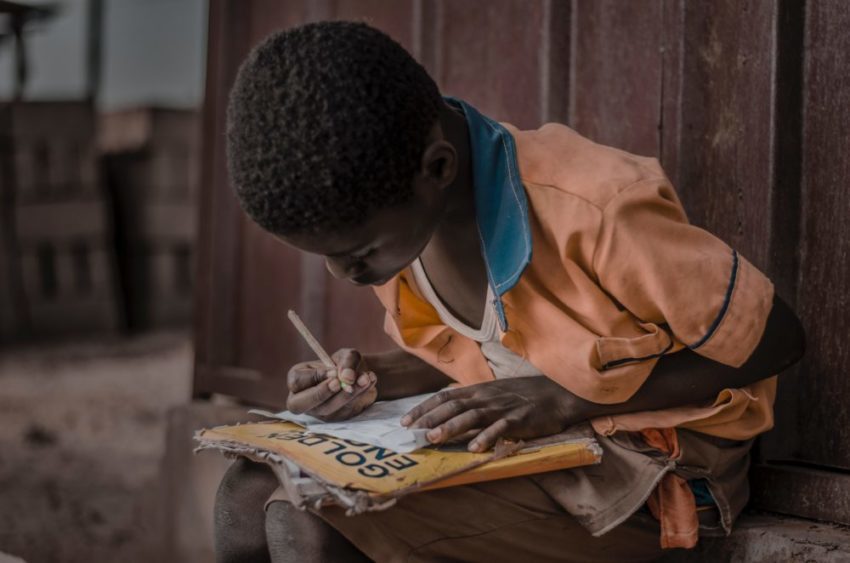 Educating girls is crucial to empowering and preparing them for successful futures, which is why Partners for Development (PfD) enables girls in Nigeria to complete their secondary school education. Through the Anne Johnson Memorial Scholarship Fund (AJMSF), established in 2014, PfD provides scholarships to girls in secondary school. We work with one of our long-term partners, Lift Above Poverty Organization (LAPO), located in Edo State, southwestern Nigeria to administer these scholarships. The scholarships, which cover about 40-50% of the recipient’s total annual school fees, have, thus far, benefited 78 girls! One recipient, Evelyn Igbalagh, called the scholarship a “blessing” that “has helped lift off the burden of education from my parents”.
Educating girls is crucial to empowering and preparing them for successful futures, which is why Partners for Development (PfD) enables girls in Nigeria to complete their secondary school education. Through the Anne Johnson Memorial Scholarship Fund (AJMSF), established in 2014, PfD provides scholarships to girls in secondary school. We work with one of our long-term partners, Lift Above Poverty Organization (LAPO), located in Edo State, southwestern Nigeria to administer these scholarships. The scholarships, which cover about 40-50% of the recipient’s total annual school fees, have, thus far, benefited 78 girls! One recipient, Evelyn Igbalagh, called the scholarship a “blessing” that “has helped lift off the burden of education from my parents”.
This International Day of the Girl Child, and in keeping with the theme “With her: A skilled girl force”, PfD is restating its committed to supporting girls in Nigeria by investing in their education. We believe that when girls are educated, entire societies are uplifted. Educated girls grow up to be teachers, doctors, entrepreneurs, etc. who invest in their communities and help to formulate solutions that reduce poverty and other challenges.
If you want to provide education opportunities for girls in Nigeria, please donate to the AJMSF. With approximately half of Nigeria’s population currently at or below the poverty line (World Bank), many families qualify for our AJMSF scholarships based on economic need alone. As a result, demand for the scholarships currently exceeds financial resources. Your money could help us educate more girls who will innovate, inspire, and transform their futures!


To educate a girl child is to invest in a better tomorrow. The evidence is clear- investing in girls’ education results in strong economies as well as healthy and stable communities. However, the UNESCO Institute for Statistics (UIS) asserts that girls have a higher chance than boys of never setting foot in a classroom. Girls continue to face indomitable challenges, which pose a significant barrier to their education; therefore, Partners for Development (PfD) has initiated a campaign to educate and empower girls.
PfD’s Anne Johnson Memorial Scholarship Fund (AJMSF), named for our late colleague Anne Johnson, aims to support the education of girls in Nigeria, where there are gender disparities in education. Boys attend secondary school at a rate that is 10% higher than girls. The literacy rate among the 15-24 age group is 76% for males and only 58% for females (UNICEF, 2013). These disparities continue to grow in the poorer northern region, where girls are forced to work rather than continue beyond primary school.
The AJMSF provides support to girls, in the form of tuition and books, to support them through Junior Secondary School thus increasing the retention of girls in secondary schools in Nigeria. The majority of donations come from individuals, and it is through their generosity that we are able to cover 40-50% of each girl’s total annual school fees, insuring the sustainability of the fund. Since its inception in the 2014/2015 academic year, the AJMSF has supported the education of 48 Nigerian girls! PfD is immensely grateful for the generous donations, which have enabled us to empower these future leaders.
 Evelyn Ivie Igbalagh (pictured to the left), age 18, is the second of five children of Mr. and Mrs. Igbalagh. Her parents are peasant farmers living in a rural community, Ehor, in Edo State in southwestern Nigeria. Income from the family’s small farm makes it very difficult to afford school fees for Ivie and her four siblings (while public school theoretically should be free in reality parents are expected to contribute for school supplies, teacher compensation, and school lunches). At times, Ivie has been forced into street hawking to supplement her family’s income, a situation that can expose her to emotional and physical abuse. Ivie’s parents made the difficult choice of sending her to live with relatives in Benin City, capital of Edo State. In exchange for work that Ivie does at the relatives’ home they help cover some of her school costs.
Evelyn Ivie Igbalagh (pictured to the left), age 18, is the second of five children of Mr. and Mrs. Igbalagh. Her parents are peasant farmers living in a rural community, Ehor, in Edo State in southwestern Nigeria. Income from the family’s small farm makes it very difficult to afford school fees for Ivie and her four siblings (while public school theoretically should be free in reality parents are expected to contribute for school supplies, teacher compensation, and school lunches). At times, Ivie has been forced into street hawking to supplement her family’s income, a situation that can expose her to emotional and physical abuse. Ivie’s parents made the difficult choice of sending her to live with relatives in Benin City, capital of Edo State. In exchange for work that Ivie does at the relatives’ home they help cover some of her school costs.
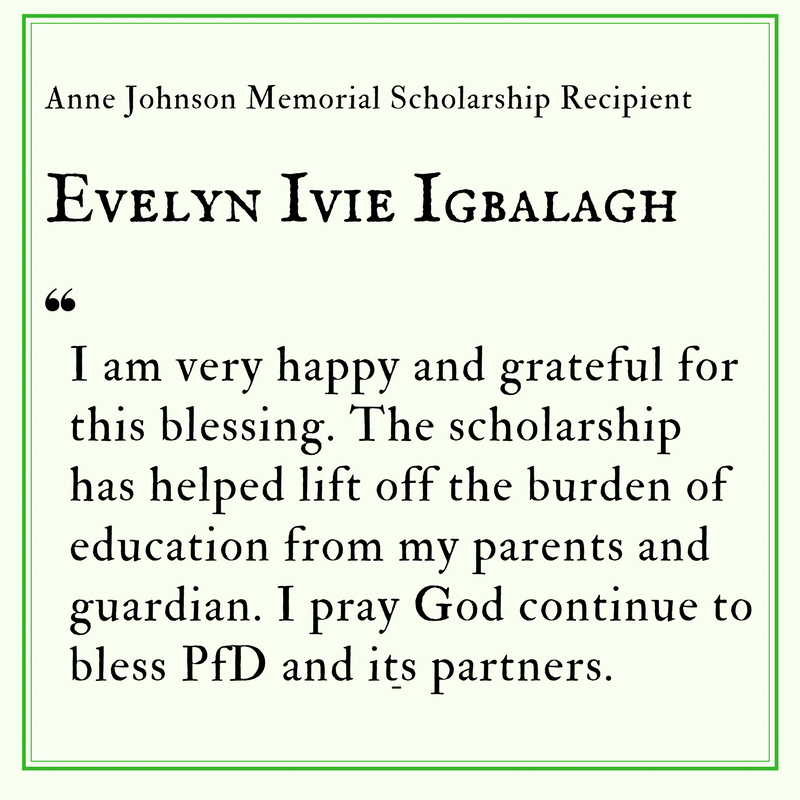 The relocation and level of poverty in her own family has slowed Ivie’s progression through the grades of secondary school. At age 18 she is several years older than most of her classmates because of her poor family status that is unable to pay for her education) at Uselu Junior Secondary School, Uselu, Benin City, Edo State where she is in her final year. Ivie is one of the Anne Johnson Memorial Scholarship recipients. She attends a mixed secondary school of about 3,000 students. Her favorite subject is Business Studies and she enjoys reading. Despite the many challenges she has faced Ivie is determined to move on to Senior Secondary School and complete the three years at that higher level. Learn more about the impact of the AJMS and read other success stories in the recent report.
The relocation and level of poverty in her own family has slowed Ivie’s progression through the grades of secondary school. At age 18 she is several years older than most of her classmates because of her poor family status that is unable to pay for her education) at Uselu Junior Secondary School, Uselu, Benin City, Edo State where she is in her final year. Ivie is one of the Anne Johnson Memorial Scholarship recipients. She attends a mixed secondary school of about 3,000 students. Her favorite subject is Business Studies and she enjoys reading. Despite the many challenges she has faced Ivie is determined to move on to Senior Secondary School and complete the three years at that higher level. Learn more about the impact of the AJMS and read other success stories in the recent report.
With the 2017/2018 Nigerian academic year commencing this October, consider making a donation to the AJMSF fund. Give the gift of a brighter future to girls like Ivie.

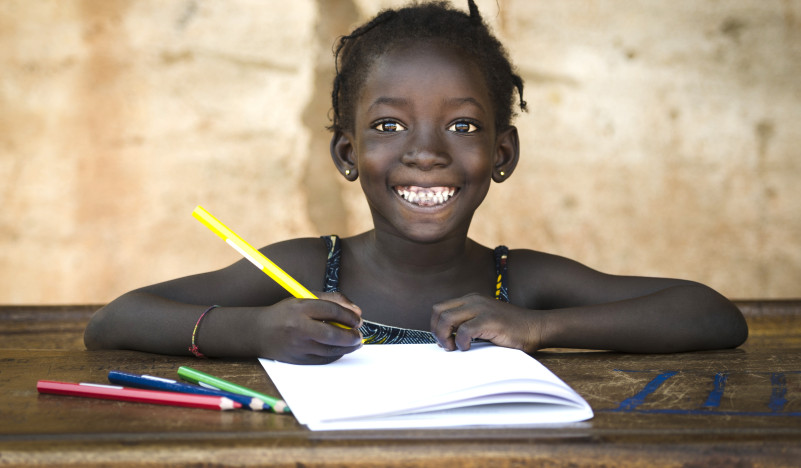
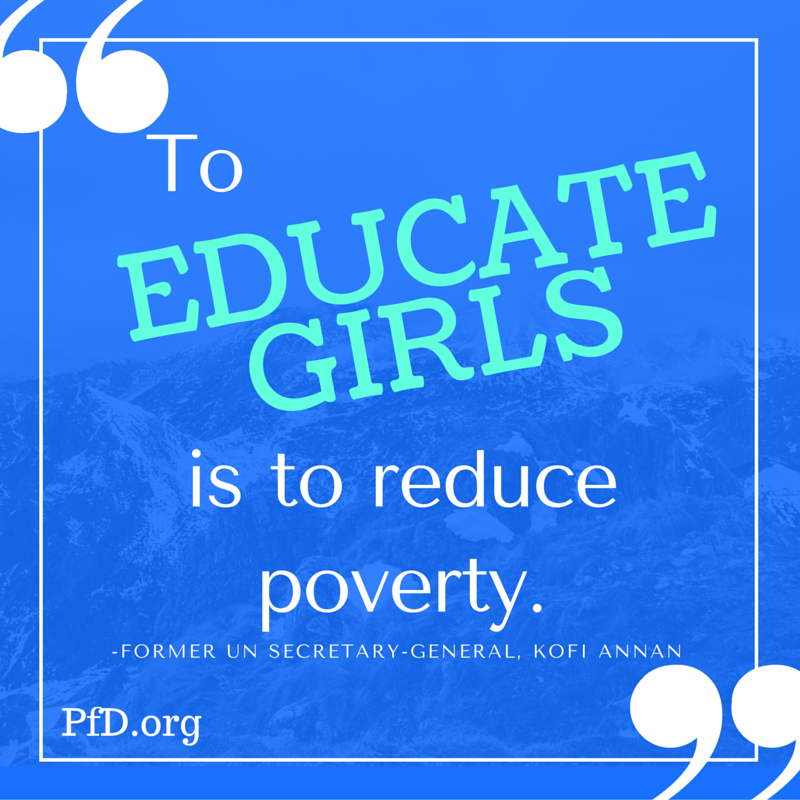
The current literacy rate for females in Nigeria is approximately 20% lower than it is for males1. Girls also spend an average of eight years in school throughout their lifetime in comparison to girls in the United States whom spend an average of 17 years. With secondary education in Nigeria costing around $500.00 annually, many young girls are unable to advance beyond elementary education without additional support. 70% of Nigerians1 also live below the poverty line and it may be quite difficult to use excess funds towards furthering their child’s education. With the help of your donation to the Scholarship Fund, PfD can significantly reduce the financial strain on families in order to continue to pay for education for their children.
Meet Lucy, one of the newest recipients of the Anne Johnson Memorial Scholarship Fund. Lucy is 12 years old, the second of three children and ranks at the top of her class. Lucy aspires to educate other young children one day by becoming a Mathematics lecturer after her studies. She is currently studying twelve subjects and loves learning at school, reading, and mathematics. All of Lucy’s textbooks for her numerous classes were provided by the Anne Johnson Memorial Scholarship Fund (AJMSF). Lucy’s dreams are much more of a reality with the help of AJMSF. Lucy’s mother, Mrs. Ifeoma, was so grateful to PfD for giving her daughter the opportunity to help further her education and promised to continue to encourage her daughter to do well in her studies and stay in school.
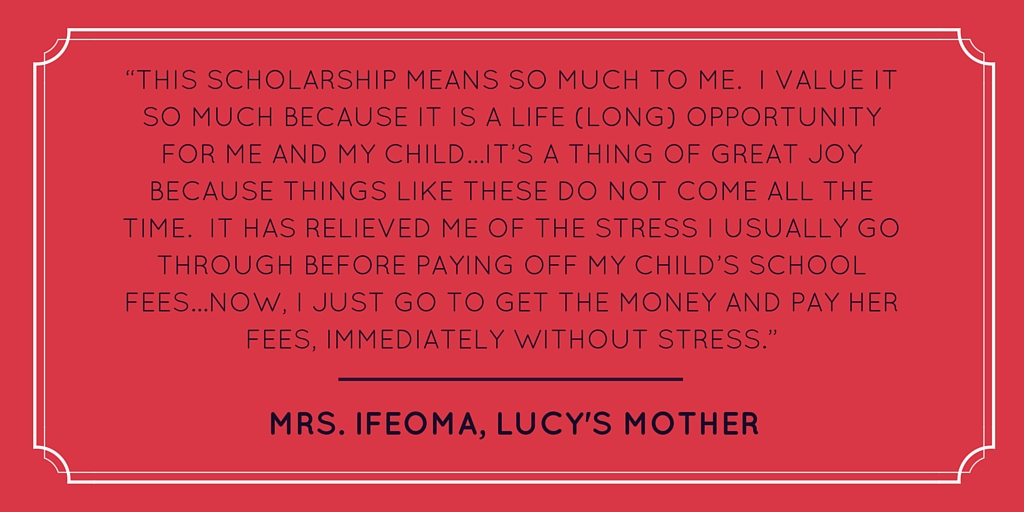
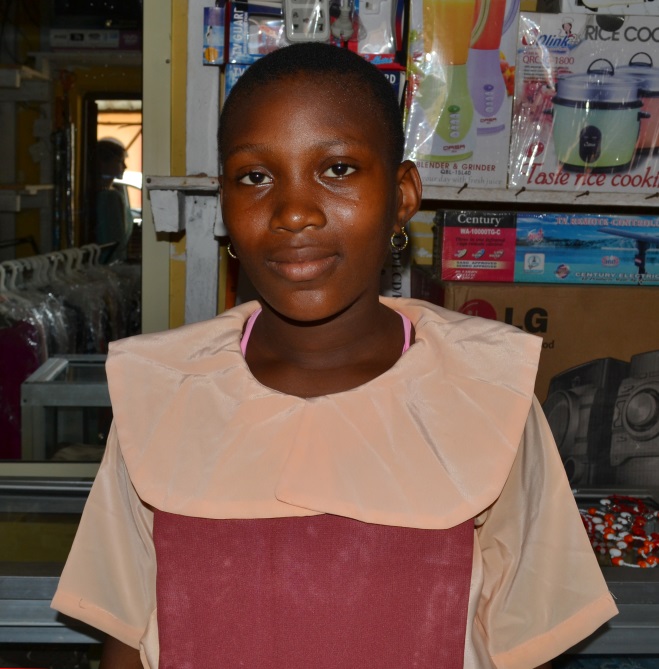 The Scholarship Fund that Lucy received was created in memorial of Anne Johnson, former PfD Country Program Director. Initially PfD, in partnership with Life Above Poverty Organization (LAPO), set a target of $20,000.00 annually to support the Scholarship endowment. However, in August 2015, less than one year after the AJMSF began, friends, family members and three institutions donated close to $30,000 in her memorial.
The Scholarship Fund that Lucy received was created in memorial of Anne Johnson, former PfD Country Program Director. Initially PfD, in partnership with Life Above Poverty Organization (LAPO), set a target of $20,000.00 annually to support the Scholarship endowment. However, in August 2015, less than one year after the AJMSF began, friends, family members and three institutions donated close to $30,000 in her memorial.
Since 2014, 26 Nigerian girls have been awarded scholarships from the AJSMF to support their secondary education. Each year, drawings are held to decide on the winners because there were so many girls who qualify for scholarships based on economic need. Staff members from LAPO and PfD meet with the winners a few times a year to track their successes in school since receiving the scholarship fund. Past AJMSF recipients have graduated from secondary school and will continue to receive support from PfD to further their education.
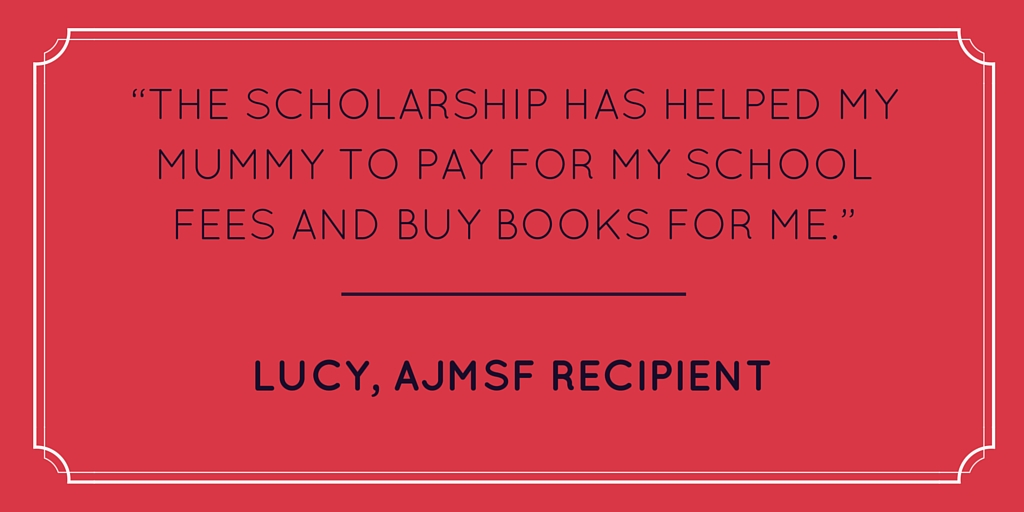 In the future, PfD and LAPO plan to give other young girls like Lucy the opportunity to help pay for secondary school and achieve their educational aspirations. To support more girls like Lucy donate $250 to the Scholarship Fund today.
In the future, PfD and LAPO plan to give other young girls like Lucy the opportunity to help pay for secondary school and achieve their educational aspirations. To support more girls like Lucy donate $250 to the Scholarship Fund today.
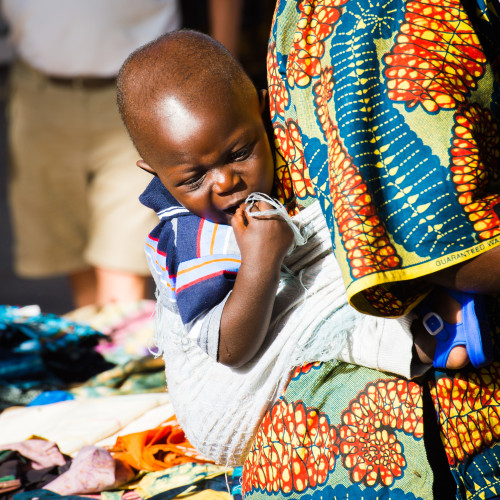
The Question of Quality: Comprehensive, Respectful, and Rights-Based Maternal Health
Imagine that you’re a young, pregnant woman. Imagine that you have to walk five miles to even get to the doctor. You arrive at the clinic, only to sit in a small, hot, overcrowded waiting room for four or more hours. When you finally do get to see a nurse, she mocks your accent, or your clothes. She scolds you for not coming in sooner, and makes you feel ashamed. Your understanding was that it was a free exam, but then you are asked to go to the pharmacy to buy gloves for the nurse. The nurse pricks your finger and says she’s testing you for a disease. You think you’ve heard of this disease, and you heard it kills people. You’re scared of it, but she doesn’t say more – doesn’t say if she thinks you might have it or if it will hurt your baby. You’re given a confusing mix of pills that are bitter tasting, and told that the clinic is out of some. The nurse says you should come back next week to get these, and that you should come back for another exam in 2 months.
Would you return to the health facility?
For many women in the developing world, this example closely resembles their experience. Each year, over 300,000 women die in pregnancy and childbirth, 99 percent of them in the developing world. For every woman who dies of pregnancy-related complications, 20 to 30 more suffer from related on-going conditions which may permanently affect their normal functioning –additional 6 to 9 million women per year. Maternal health advocates, researchers, and providers are committed to ending human rights abuses and promoting skilled and dignified care. Together, we can make comprehensive, respectful, and rights-based maternal health care available to all.
Maternal mortality and morbidity are the tragic result of a myriad of compounding factors. 75% of maternal deaths are caused by severe bleeding, infections, high blood pressure during pregnancy, complications from delivery, and unsafe abortion. Other deaths are often caused by or associated with other diseases such as malaria or AIDS. Delivering at a medical facility with a skilled health care worker present is critical should these complications arise, but often they can be avoided altogether if a woman attends antenatal care visits. However, only 40% of women in low-income countries complete the recommended number of antenatal care visits.
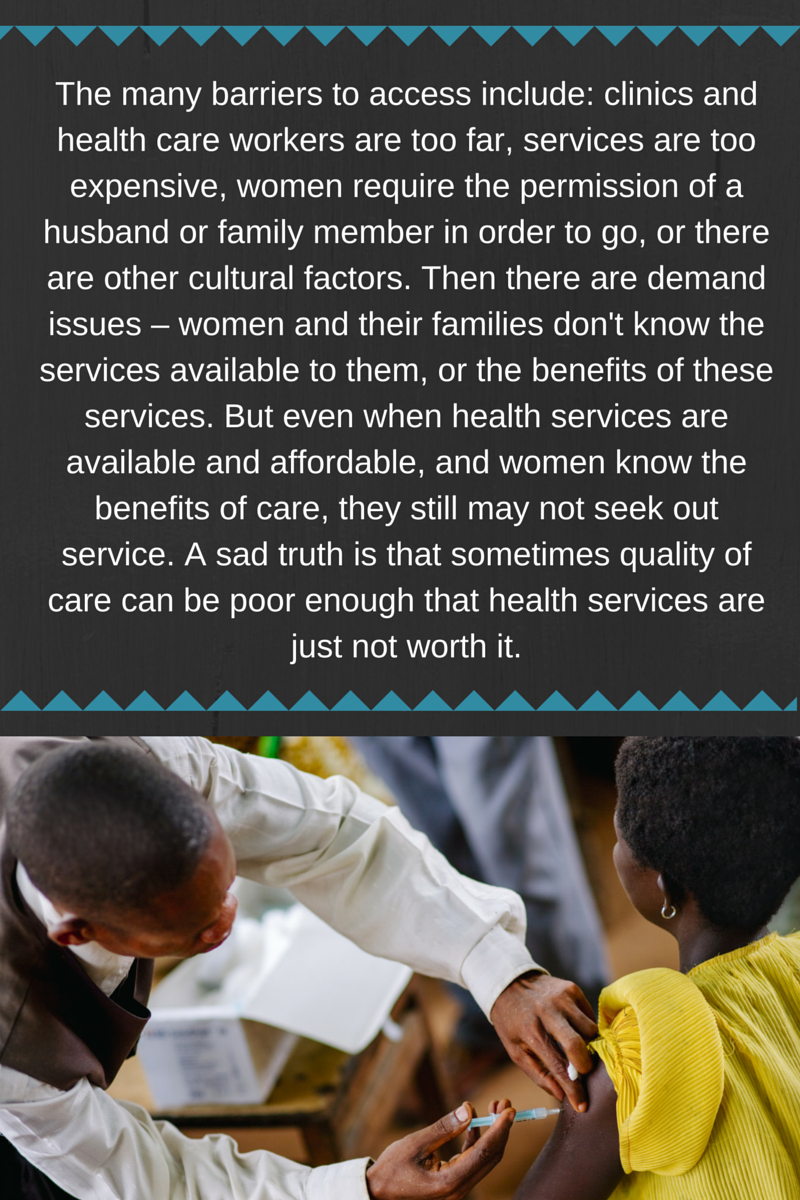
As the example above illustrates, accessing care for some women can not only be difficult, it can be intimidating, humiliating, and scary. Unsurprisingly, receiving poor care makes women less likely seek health care out in the future. This is why it’s crucial to not only provide access (by making healthcare close and affordable), to educate women, their families, and their communities about the importance of maternal health care, but also to work with health clinics and health workers to ensure quality of care – the respectful, comprehensive, and competent care that every human deserves.
At PfD, we deliver integrated programs that address the nuanced reality on the ground. In Nigeria, we not only provide education to women, their families, and communities and engage with key community leaders to change behavior. We also work with health care providers to ensure that they have the knowledge and resources to provide quality care. PfD worked to deliver improved maternal, newborn, and child health services through the training and mentoring of health care personnel, including nurses and midwives, community health extension workers, and community based healthcare volunteers. PfD trained nurses and midwives on quality of care and trained health care workers on Balanced Counseling Strategy which improves client-provider interactions and client satisfaction. The results of this project speak for themselves – In the first year of the project, 15,562 women attended at least one session of antenatal care during pregnancy – by the end of the project over 44,000 did. This represents an increase of over 280%.
Through the Scale-up of Prevention of Mother-to-Child Transmission and Pediatric HIV/AIDS services in Delta State, Nigeria, PfD built the capacity of health facilities, training health workers to provide quality HIV testing and counseling, integrating Prevention of Mother-to-Child Transmission and HIV care into antenatal care services, and upgrading and equipping a laboratory to service as a comprehensive treatment hub. PfD trained health care workers and pregnant women received HIV testing and counseling. PfD also facilitated testing of pregnant women for HIV.
PfD is committed to the idea that no woman should be in danger because she gives birth, which is why we’re joining the global community in calling on the UN Secretary General to recognize April 11th as the International Day for Maternal Health and Rights. Together with the UN community we can make comprehensive, respectful, and rights-based maternal health care available to all. To sign the petition,click here. Follow the discussion at #IntlMHDay and through PfD’s social media updates. To learn more about our work to promote maternal health and healthy communities, click here.
April 6th, 2016, by Katie Baczewski, PfD Program Officer
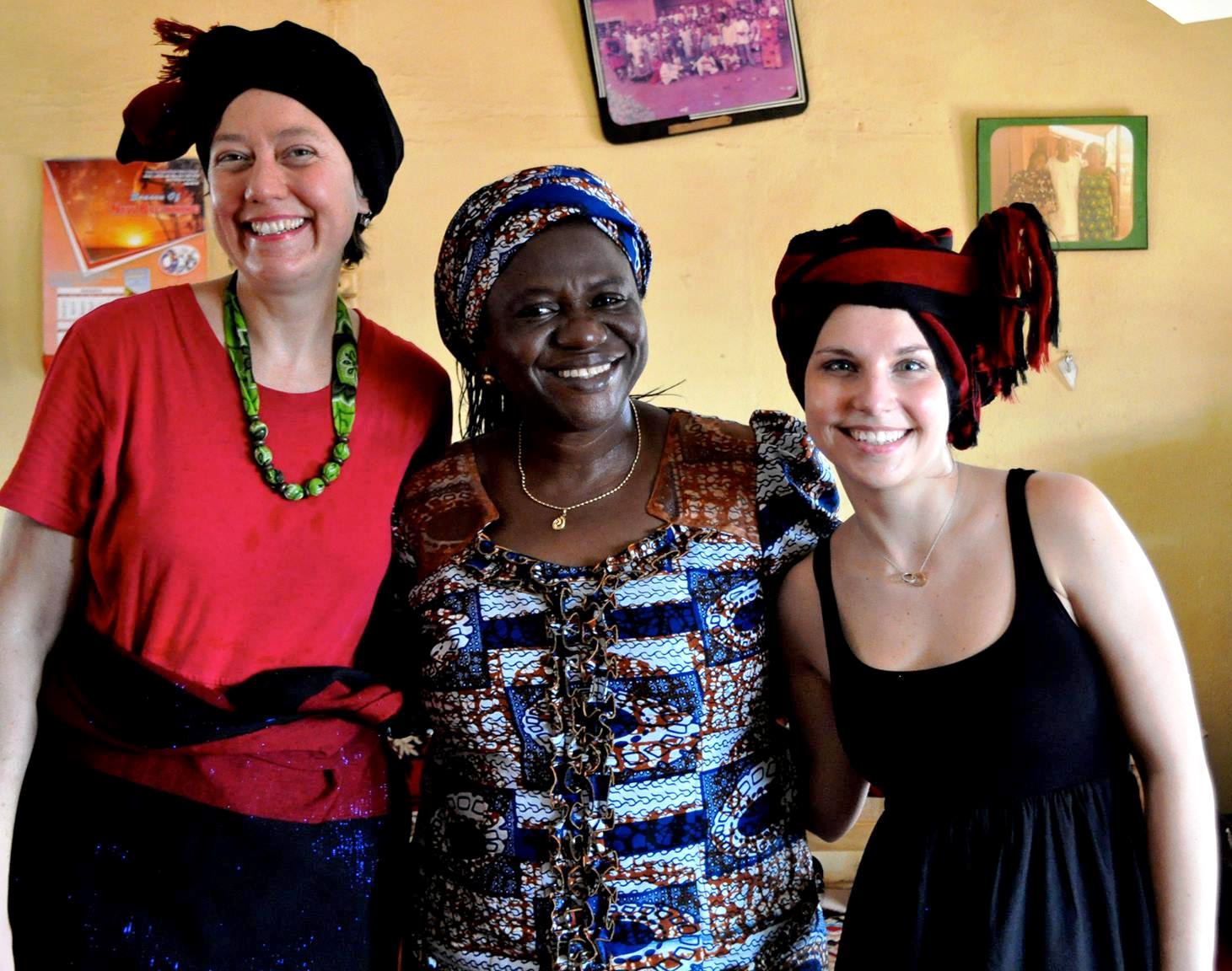
As a young Program Officer working in the Partners for Development (PfD) headquarters, I still remember the first time I met Anne Johnson, PfD’s Nigeria Country Program Director at the time. Although she barely knew me, Anne had such warmth about her she instantly made me feel like we were old friends. Anne had the rare ability to make others feel comfortable in their own skin. Her overflowing positive energy was infectious. Anne was able to bring out the best in you.
 Anne was passionate about many subjects, including girls’ education in Nigeria; hence PfD’s efforts to honor her memory through the Anne Johnson Memorial Scholarship Fund. Numerous studies have demonstrated the relationship in developing nations between education and social and economic well-being: females with a secondary education have lower fertility levels which in turn translates to better physical and economic health for them and their families. “Educating girls can transform whole communities” (Earth Policy Institute, 2011).
Anne was passionate about many subjects, including girls’ education in Nigeria; hence PfD’s efforts to honor her memory through the Anne Johnson Memorial Scholarship Fund. Numerous studies have demonstrated the relationship in developing nations between education and social and economic well-being: females with a secondary education have lower fertility levels which in turn translates to better physical and economic health for them and their families. “Educating girls can transform whole communities” (Earth Policy Institute, 2011).
To PfD Anne was a gifted Country Program Director, Director of Programs, consultant and driving force behind much of PfD’s amazing work. She had an unrivaled passion for the work PfD did and believed in each and every one of our programs. To me, Anne was a mentor, a friend, and an inspiration. Anne epitomizes the passion that drives PfD’s mission. Although Anne’s work with PfD was cut short by illness, her legacy lives on in the people she touched—from the hundreds of field staff, partners and PfD employees to the thousands of women, men and now young girls she helps achieve.
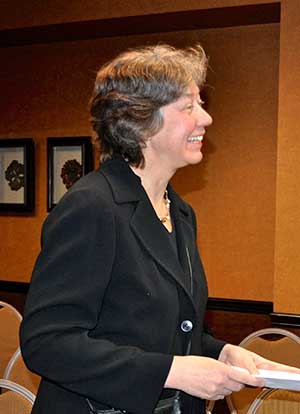 I still remember how confident she was that my background in journalism was just what her staff needed. Anne gave me my first chance to prove myself. She never stopped pushing me—or PfD. As frustrating and difficult as things got, Anne always had a positive spin on everything. Every conversation began and ended with laughter. Anne was one of the most genuine and loving people I have ever come across. In developing my management style, I aimed to emulate Anne’s effortless ability to take things in stride, find the humor in just about everything and believe in people. She was truly a remarkable person and PfD was lucky enough to have a 20-year relationship with Anne. Anne truly was PfD and because of Anne, I am proud to say that #IamPfD too.
I still remember how confident she was that my background in journalism was just what her staff needed. Anne gave me my first chance to prove myself. She never stopped pushing me—or PfD. As frustrating and difficult as things got, Anne always had a positive spin on everything. Every conversation began and ended with laughter. Anne was one of the most genuine and loving people I have ever come across. In developing my management style, I aimed to emulate Anne’s effortless ability to take things in stride, find the humor in just about everything and believe in people. She was truly a remarkable person and PfD was lucky enough to have a 20-year relationship with Anne. Anne truly was PfD and because of Anne, I am proud to say that #IamPfD too.
**Anne Johnson died on Christmas Eve 2013 after a lengthy battle with cancer. Anne’s commitment to PfD continues today in the form of her scholarship fund for young girls in Nigeria. Her full biography and obituary are available on the PfD website.**
Yoga Burn is a yoga based workout program that is specifically tailored to help women lose weight and shape up. Yoga Burn Reviewsis a complete 12 week program designed to help you tone and firm your body while losing weight and improving flexibility. Zoe Bray-Cotton is the creator behind
Throughout all of December we will be sharing stories from our staff, board, partners, and others from around the globe. We can’t wait to share all of the hopeful, engaging, and positive stories from our work. We will be using the hashtag #IamPfD on Facebook, Twitter and LinkedIn.

Be sure to share the posts that you find engaging and inspiring with friends and family and don’t forget to donate and take an #unselfie of you making a donation and share it with us and use the #IamPfD for a chance to win prizes from PfD.
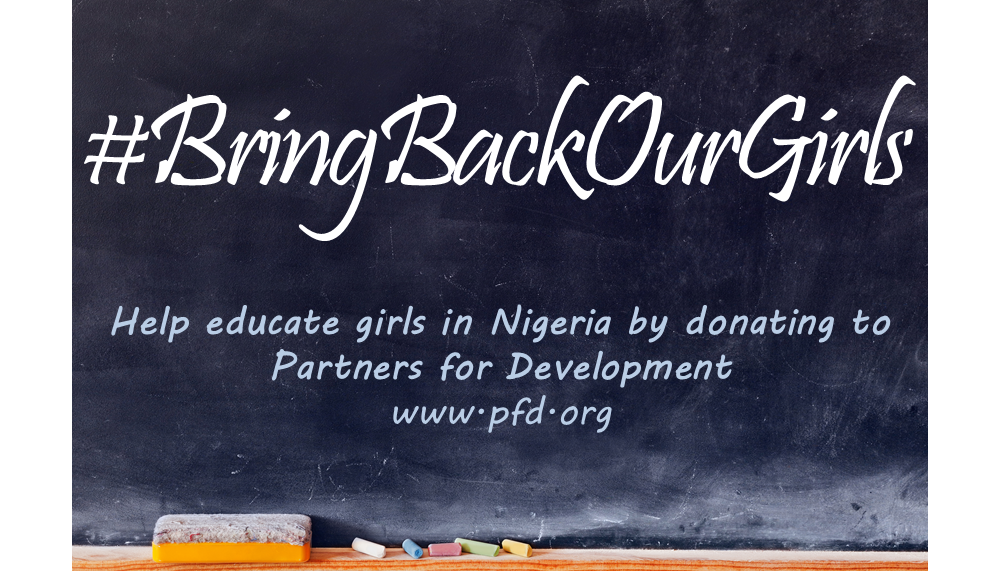
This week marked the one year anniversary of the abduction of the 276 Chibok girls by extremist group “Boko Haram” in Nigeria. This unfortunate anniversary comes with a gift of optimism as around 300 young girls and 150 women were recently found in the Sambisa Forest this past week by Nigerian forces (AP). The Nigerian military has not determined if any of the rescued women and girls were abducted from Chibok or from other areas. The rescue represents hope for the Chibok girls to be returned home (AP).
 In addition to the devastating abduction of the Chibok girls, the communities in Nigeria have faced numerous other challenges, including a decreased ability for international organizations to operate and implement programming. PfD has, for example, experienced delays in implementing activities in some locations close to Boko Haram strongholds and was forced to relocate beneficiaries to safer locations for trainings. On several occasions, alternative and longer travel routes were used to in order avoid attacks. In addition, losses were recorded in PfD’s microfinance program activities due to significant relocation and attrition of borrowers and difficulty in recruiting quality staff in the northern areas.
In addition to the devastating abduction of the Chibok girls, the communities in Nigeria have faced numerous other challenges, including a decreased ability for international organizations to operate and implement programming. PfD has, for example, experienced delays in implementing activities in some locations close to Boko Haram strongholds and was forced to relocate beneficiaries to safer locations for trainings. On several occasions, alternative and longer travel routes were used to in order avoid attacks. In addition, losses were recorded in PfD’s microfinance program activities due to significant relocation and attrition of borrowers and difficulty in recruiting quality staff in the northern areas.
Despite these challenges, employing local staff with a deep understanding of the political, cultural, and security situation has allowed PfD to continue to implement its health program in northern Bauchi State of Nigeria.
Aside from the loss of numerous human lives, destruction of infrastructures and the general deterioration of the economy in the northern region, the education sector has suffered immensely. According to UNICEF, 800,000 children have been displaced throughout Nigeria due to “Boko Haram” violence. The sheer number of displacements combined with a high level of fear of attending school in those areas poses a major threat to the future of the education sector in the northeastern part of the country.
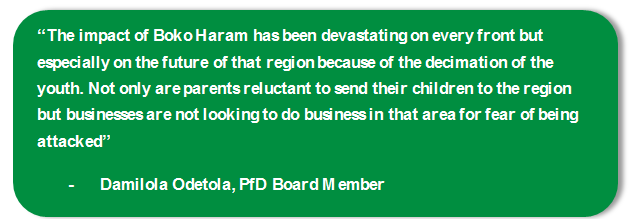 In Nigeria, “about 10.1 million children who are supposed to be in basic education were not in school. In other words, almost one out of every three primary age children is out of school, and roughly one out of four junior secondary age children is out of school” (UNESCO 2012).
In Nigeria, “about 10.1 million children who are supposed to be in basic education were not in school. In other words, almost one out of every three primary age children is out of school, and roughly one out of four junior secondary age children is out of school” (UNESCO 2012).
In a country where school turnout was a serious issue well before the insurgence of “Boko Haram”, the latter has “further compounded the problem of school attendance by destroying school infrastructure and displacing people fleeing violence” according to Lanre Williams-Ayedun, PfD Board Member.
So what are we doing about it?
Educating girls yields a positive impact on economic development and the health of the family overall. PFD continues to advocate for girls’ education in Nigeria through its Anne Johnson Memorial Scholarship Fund (AJMSF) created in honor of the late Anne Johnson, a former Nigeria Program Director who was critically engaged and passionate about girls’ education. In partnership with two local organizations, Gerewa and Lift Above Poverty Organization (LAPO), PfD provides scholarships and opportunities for disadvantaged girls.
Solution and opportunities – What needs be done?
Besides strictly following PfD’s security guidelines, PfD staff members are also in constant communication with members of communities in which it operates to provide intelligence on security situation before any travels around locations infested with insurgents. Communities that surround “Boko Haram” strongholds need to relate useful information to authorities to help facilitate the search and rescue process. If and when the girls are found, steps also need to be taken by the government to provide counseling services to the kidnapped girls and facilitate their reinsertion into their community and society.
What can you do?
- Donate to the Anne Johnson Memorial Scholarship Fundto help girls learn in Nigeria
- Share this post and continue to raise awareness regarding and help girls learn in Nigeria
- Learn about and promote the Safe School Initiative
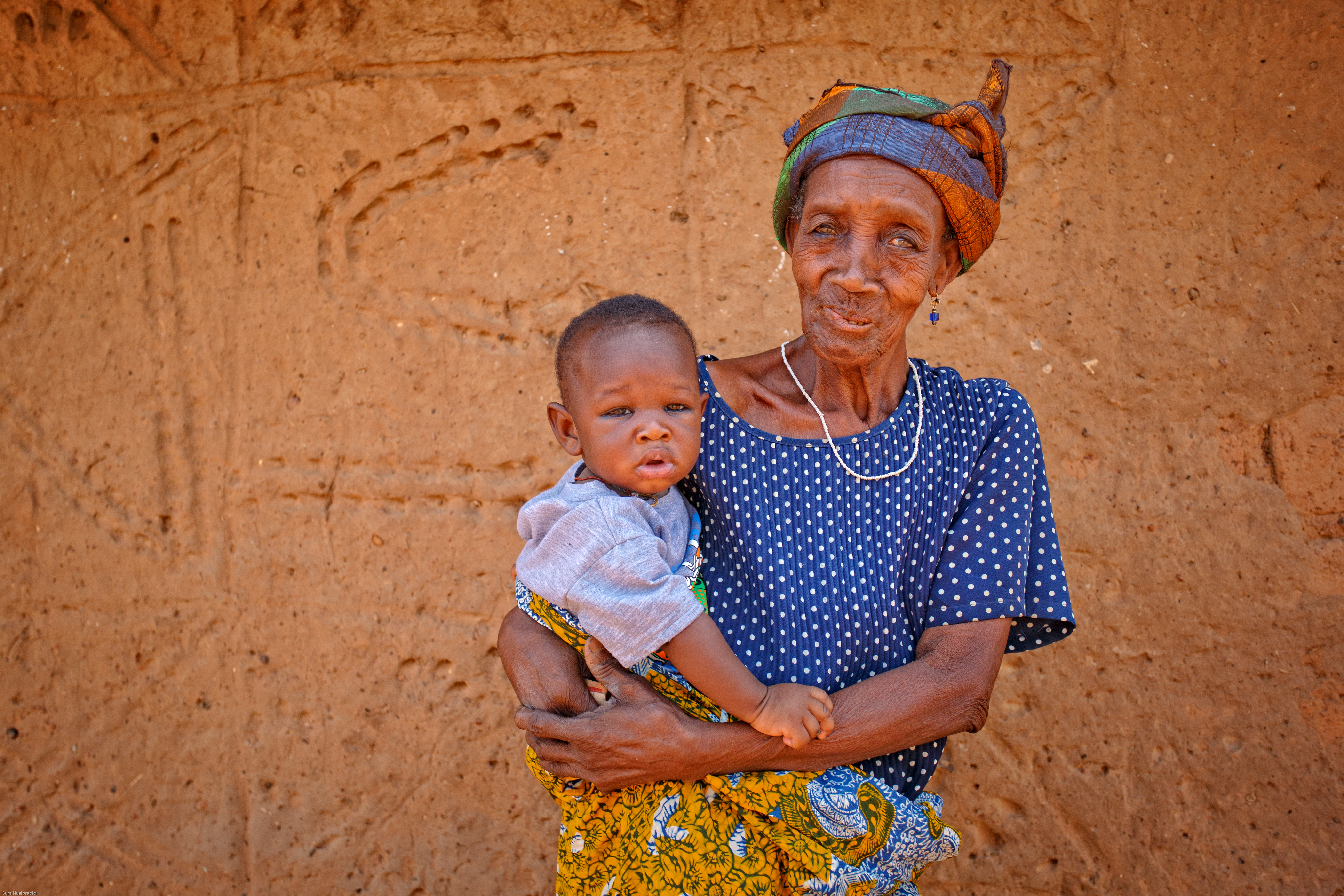
Today, on the 67th anniversary of the creation of the World Health Organization (WHO), individuals and organizations have the opportunity to highlight initiatives around the globe that promote better health. Thus today, PFD shines the spotlight on our work in Sexual Reproductive Health and Rights (SRHR) around the globe.
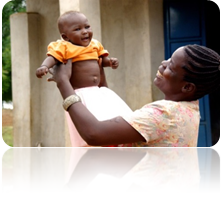 Improving Sexual Reproductive Health Rights (SRHR) is essential for the physical, mental and social wellbeing of individuals, especially women. While progress has been made, women frequently suffer from unequal gender relations, limiting their physical agency and ability to negotiate safe sex. In the developing world, as many as 222 million women do not have access to any methods of contraception (WHO 2015). The consequences of this are far reaching including maternal mortality, physiological trauma, higher rates of STDs and higher numbers of infant mortality. Thus, SRHR is a crucial human rights issue that has long-term implications on global health and international development as a whole.
Improving Sexual Reproductive Health Rights (SRHR) is essential for the physical, mental and social wellbeing of individuals, especially women. While progress has been made, women frequently suffer from unequal gender relations, limiting their physical agency and ability to negotiate safe sex. In the developing world, as many as 222 million women do not have access to any methods of contraception (WHO 2015). The consequences of this are far reaching including maternal mortality, physiological trauma, higher rates of STDs and higher numbers of infant mortality. Thus, SRHR is a crucial human rights issue that has long-term implications on global health and international development as a whole.
PFD has an extensive history with reproductive health programming in both Africa and Asia. In Cambodia, for example, beginning in 2004, PFD partnered with the United Nations Fund for Population Activities (UNFPA) to provide access to quality reproductive health education and services. The program was primarily targeted towards young people ages 10-24 in Kratie Province. PFD also integrated HIV/AIDS prevention into our SRHR programing. This collaboration increased effectiveness and efficiency by reaching the youth with education on both the key issues of reproductive health and disease prevention simultaneously.
Since its initial work in Cambodia, PFD has expanded its reproductive health targeted programming toNigeria. Working in some of the most challenging areas in Nigeria, PFD has successfully implemented integrative reproductive health programming with microfinance initiatives. In Bauchi State, a northern province in Nigeria, PFD has expanded its health systems project Targeted States High Impact Project (TSHIP) in collaboration with John Snow International (JSI) and funded by United States Agency for International Development (USAID). TSHIP fosters improvement of reproductive and family planning services through grassroots techniques and local partnerships. PFD has combined these programs with income generating activities that facilitate business skills and small enterprise development, improving the personal autonomy and livelihoods of poor women.
TSHIP Outcomes as of December 2014:
- Provided Reproductive Health (RH) counseling to 37,528 to males and females or reproductive age.
- Increased the completion rate of individual RH referrals to 74%.
- Provided intermittent preventive treatment (IPT) for malaria to 57,067 pregnant women.
- Aided 10,286 births with skilled attendants.
What can you do?
You too can make an impact on World Health Day. Show your support by sharing on social media and tagging @Partners4dev on Twitter or following us on Facebook. Support Partners for Development’s work in health around the globe and donate here.

Women across the world face many challenges to equality, from access to economic, health, and education resources, to violence within communities and households. To commemorate International Women’s Day on March 8th and this year’s theme Make it Happen, PFD will be honoring the achievements of women around the globe.
Investing in women important not only because it ensures equality, but also because investing in women can produce positive externalities, expanding the impact of each dollar invested.
PFD works across the globe in three main sectors:
PFD works with and supports microfinance organizations and institutions around the world, to increase access to credit for underserved populations. In these programs, over 91% of borrowers were women. PFD has found that when these entrepreneurial women generate additional income, a large portion is reinvested into the family, often paying for school fees for their children. In Nigeria, PFD and Lift Above Poverty Organization (LAPO), a local microfinance organization, further assist women to invest in their families by offering to fund scholarships to daughters of women microfinance clients. According to the World Bank, one additional year of education for girls results in lower infant mortality and higher future incomes. By funding scholarships for girls, PFD and LAPO are also investing in future generations.
On International Women’s Day and always we honor these women.
Health 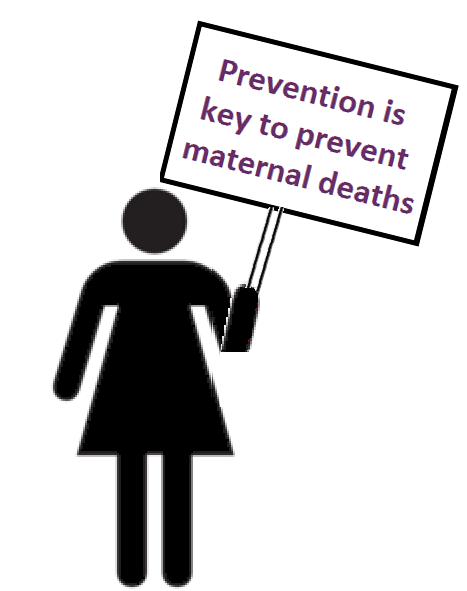 PFD trains community health volunteers to spread health information within their communities. Women who receive this training not only are able to implement changes for themselves, but they also can implement healthier practices for their families. The women are trained to spread the information in the communities and by reaching out to other women, can indirectly reach their families. In Cambodia, for instance, from 2012-2014, PFD trained over 1,500 village health volunteers in malaria health education, a majority of whom were women. In 2013, there were almost 300,000 maternal deaths worldwide related to pregnancy and childbirth. PFD works to prevent deaths by increasing access to skilled health services. In 2013 in Nigeria, with the support of PFD and local partners, 45,501 women attended at least one antenatal care visit and 19,483 women were assisted by skilled delivery attendants during childbirth.
PFD trains community health volunteers to spread health information within their communities. Women who receive this training not only are able to implement changes for themselves, but they also can implement healthier practices for their families. The women are trained to spread the information in the communities and by reaching out to other women, can indirectly reach their families. In Cambodia, for instance, from 2012-2014, PFD trained over 1,500 village health volunteers in malaria health education, a majority of whom were women. In 2013, there were almost 300,000 maternal deaths worldwide related to pregnancy and childbirth. PFD works to prevent deaths by increasing access to skilled health services. In 2013 in Nigeria, with the support of PFD and local partners, 45,501 women attended at least one antenatal care visit and 19,483 women were assisted by skilled delivery attendants during childbirth.
USAID reported in its 2012 “Gender Equality and Female Empowerment Policy” that ensuring women farmers have the same access to land, technology, and credit, crop yields can be increased “as much as 30 percent and feed an additional 150 million people”. In Benin, PFD is implementing USDA’s Growing Resources for Enhanced Agricultural Enterprises and Nutrition (GREEN). GREEN Project is working with farmers associations to increase farm revenues and productivity by building knowledge through trainings, providing information on markets and price information, and increasing access to credit. In 2013 and 2014, through GREEN, PFD and its partners were able to reach over 48,413 farmers, around half of whom were women, with trainings on farming techniques, markets and value chains, and on business development skills. Additionally, PFD integrated its micro-credit methodology into GREEN, increasing access to credit to farmers so they can implement the newly learned skills. Of the 4,680 loans made to farmers, and over 2,250 of the loans were given to women.
On International Women’s Day and always we praise the hard work and perseverance of these women.
How can you Make it Happen?
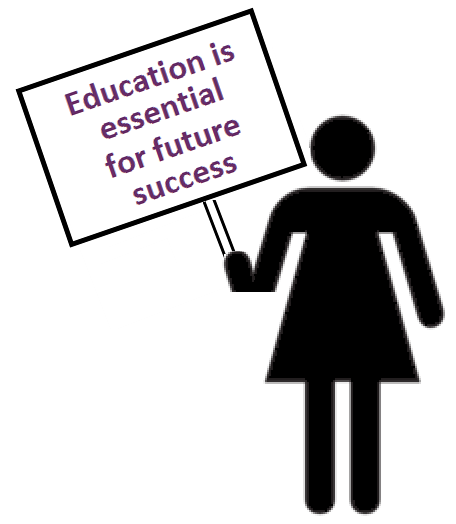
Support Girls’ Education: Help educate and empower the next generation of young women by contributing to PFD here and designating the Nigerian Scholarship fund for Girls.
Give your Support: Support PFD to develop new, innovative programs that support women and girls around the globe here.
Use your voice: Post about women’s social, economic & political achievements using the hashtag #makeithappen or #womensday! Don’t forget to also use the PFD handle @Partners4Dev so we can share your message too!
Spread the word: Repost this blog on social media to help support the movement.

In memory of Anne Johnson, former Nigeria Country Program Director and dedicated PFD team member for over 20 years, PFD has created the Anne Johnson Memorial Scholarship. One of Anne’s greatest passions and development interests was girl’s education. PFD, in partnership with local partner Lift Above Poverty Organization (LAPO), will provide scholarships to girls in secondary school. In order to help break the cycle of poverty and allow for the next generation to thrive, the scholarships are awarded to the girls of microcredit borrowers.
 When you educate a girl, you can break cycles of poverty in just one generation. When 10 percent more girls go to school, a country’s GDP increases on average by three percent (Educate Girls, Change the World).
When you educate a girl, you can break cycles of poverty in just one generation. When 10 percent more girls go to school, a country’s GDP increases on average by three percent (Educate Girls, Change the World).
While Nigeria has made strides in recent years in educating its children, there are still disparities by gender: boys attend secondary school (equivalent to American middle and high school levels) at a rate about 10% higher than girls, with that difference growing in the country’s poorer north where households often want girls to work rather than continue beyond primary school (elementary level in the USA). Meanwhile, amongst young people ages 15-24, the literacy rate for males is 76%, but only 58% for females, a difference of 31% (UNICEF, 2013).
Numerous studies have demonstrated the relationship in developing nations between education and social and economic well-being: females with a secondary education have lower fertility levels which in turn translates to better physical and economic health for them and their families. “Educating girls can transform whole communities” (Earth Policy Institute, 2011).
On October 8th, 2014 PFD announced the first ten winners of scholarships under The Anne Johnson Memorial Scholarship Fund at a ceremony in Benin City, Edo State. In order to be eligible, families must demonstrate both economic need and support for their daughters’ education. Economic need in Nigeria is substantial: the World Bank estimates that at least 46% of the population, or as many as 80 million people live in poverty in Nigeria (some sources place the estimate closer to 60%). Chairperson of LAPO Scholarship Board, Prof. Christiana Okojie remarked on the impact of the scholarship program to families, “in the six years the LAPO Scholarship Scheme has existed, it has given succor to parents and brighter future[s] to many children of LAPO clients. Many parents have savored the joy of seeing their children excel through secondary and now through the university.”
Because there are so many girls qualifying for scholarships based on economic need, the names of eligible candidates were placed together, and a drawing was held. The educational seriousness of those candidates and their families’ support to their educational future were then assessed before the list of ten girls was finalized.
Along with the scholarship fund, PFD has provided over $2 million dollars to LAPO to loan to its borrowers, 93% of which are women. Since 2001, working with over 20 microfinance institutions, PFD has offered credit services to target vulnerable populations, particularly women, farmers and small entrepreneurs. PFD integrates training on business development and messaging on reproductive and family planning into its microfinance model.
Anne Johnson’s memory is honored and her legacy of work in Nigeria is continued through the new educational opportunities created for girls in Nigeria by the Scholarship Fund. Learn more about Anne Johnson’s life and work with PFD here.
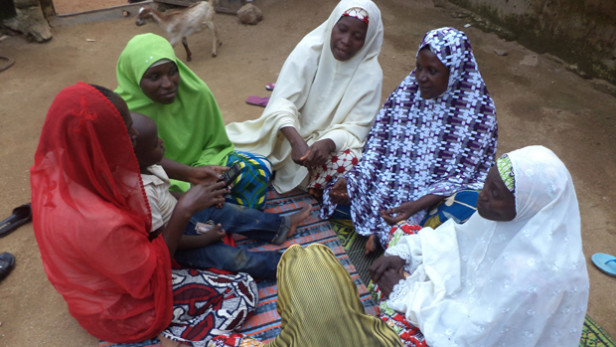
Originally published on DevEx through the Healthy Means Campaign
By: Dr. Valerie Flax

In resource-constrained settings, early and exclusive breastfeeding prevents infant and child deaths from diarrhea and other infectious diseases, supports normal growth, and improves cognitive performance throughout childhood. Yet, optimal breastfeeding practices are declining globally, with less than half of the world’s newborns benefitting from early breastfeeding and about one-third exclusively breastfed for the first six months of life. Low-cost and effective strategies to improve breastfeeding behaviors in underserved areas are urgently needed.
Photo 1: A credit officer leads a discussion on breastfeeding during a monthly microcredit meeting in Bauchi State, Nigeria
how to download norton antivirus on windows 8 on 8 using complete setup guide
Two ways to efficiently reach out to a large number of women with messages on breastfeeding are through microfinance programs and cell phone messages. Incorporating health programs into microfinance takes advantage of the social networks and social support inherent in group activities and that type of support is needed to change breastfeeding behaviors. Cell phone messages are a great way to increase the number of repeated contacts with women who most need encouragement to breastfeed. Partners for Development and researchers from the University of North Carolina tested these ideas in northeast Nigeria by integrating group breastfeeding promotion and cellphone messaging into a microcredit program. The integrated program increased the number of women who started breastfeeding early and who exclusively breastfed their infants for six months.
We reached out to women participating in a microcredit program, a system in which small business owners, often women, receive loans to begin or advance their enterprise. Small groups of five to seven friends, neighbors and/or relatives join the program together and meet regularly with several other small groups to repay their microloans.
Every month, credit officers led discussions about breastfeeding during microcredit meetings. Sessions covered recommendations for early and exclusive breastfeeding, benefits of following breastfeeding recommendations, breastfeeding techniques and timing for introducing complementary foods. Key messages from the meetings were sent as text and voice messages to phones that were given to small-group leaders, who were instructed to share the messages. Group members selected some messages to be dramatized or turned into songs and performed at monthly microcredit meetings.
Giving phones to small groups of women was a key component of the program. It pushed them to gather together to review and discuss the messages. Many groups also shared the messages with other community members, thereby facilitating a shift in social norms related to breastfeeding practices. One phone holder explained her experiences, “This is a trust given to me that when a message comes to the phone, I must try my best to share it with women in the group. I don’t only share with members of the group, but include neighbors. Even during casual discussions, as we pass time, I find a way to chip in something about our program to attract them. This way they have accepted the messages I share that come through the phone.”
By building innovative face-to-face and mobile health components onto a microcredit program, we can spread messages to women in the groups and their friends and neighbors, greatly broadening the impact. The intervention could be scaled up in Nigeria and adopted more widely given that nearly 200 million women, many of childbearing age, are involved in microfinance globally. Assuming that each woman participating can have an impact on 5 of her family members and friends, this type of program, if scaled up, has the potential to benefit 1 billion worldwide.
Author Valerie L. Flax, PhD, Assistant Professor of Nutrition in the UNC Gillings School of Global Public Health, led the study through the Partners for Development with funding from the Alive and Thrive small grants program. The study involved women from communities in the Bauchi State in northern Nigeria. This trial was registered at clinicaltrials.gov as NCT01352351. The Journal of Nutrition published the research in July 2014. Partners for Development is a non-profit organization with community-driven programs in Africa and Southeast Asia. PFD works with vulnerable populations in the areas of health, agriculture, food security, livelihoods, and microfinance.



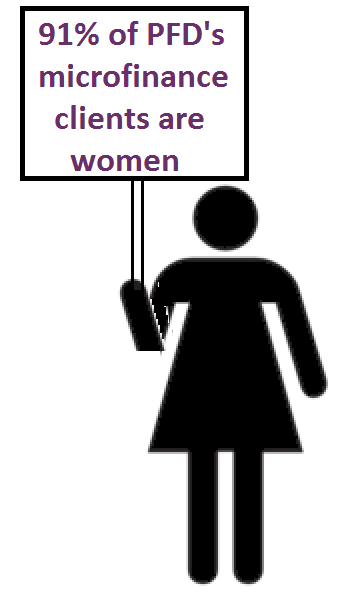 Economic Growth
Economic Growth